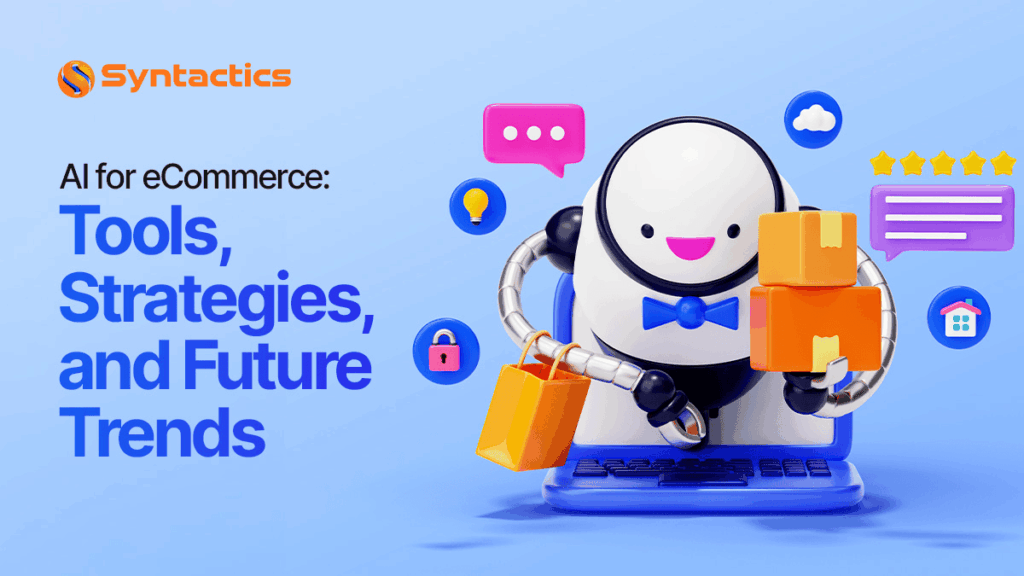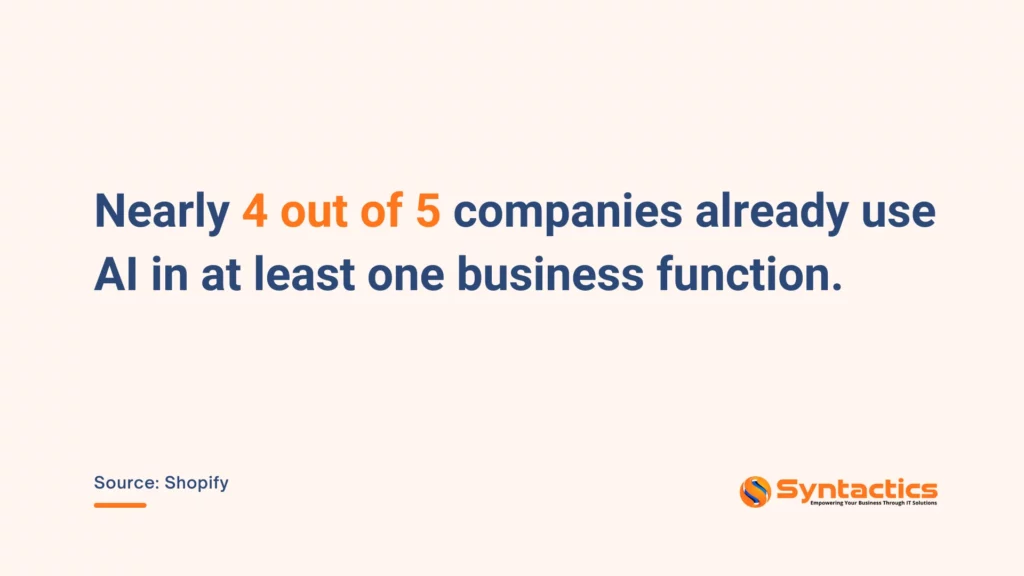
AI for eCommerce: Tools, Strategies, and Future Trends
Redefine your business with AI for eCommerce to boost sales, automate processes, and personalize shopping. Discover the top AI tools, strategies, and trends you need.
AI (Artificial Intelligence) for eCommerce has transformed the way online businesses operate. From personalized shopping experiences to automated customer service, AI is no longer a futuristic concept. In fact, even global eCommerce giants like Amazon and Alibaba, and small businesses, have been adopting AI to compete on a bigger scale.

Source: Shopify
This rapid adoption is driven by AI’s ability to simplify processes, reduce operational costs, and enhance customer satisfaction. By analyzing customer behavior, predicting buying trends, and automating repetitive tasks, AI enables businesses to operate more efficiently and competitively.
Key Takeaways
- 95% of eCommerce companies in the U.S. experienced a very good Return on Investment (ROI) when adopting AI technologies. [Statista]
- Alibaba’s AI-powered recommendations, fueled by vast consumer data, have boosted Click-through Rates (CTRs) by 38% and conversions by 25%. [MindtheProduct]
- Website visitors from AI search are four times more valuable than organic search visitors. [Semrush]
- The future of AI in eCommerce includes hyper-personalization, voice commerce, and predictive analytics.
- Investing in AI now positions your business for long-term success.
TABLE OF CONTENTS
Key Takeaways
7 Benefits of AI in Online Retail
How AI Enhances eCommerce Experiences
Top AI Tools for eCommerce Platforms
Implementation Best Practices
Final Thoughts: Should You Invest Now?
FAQs About AI for eCommerce
7 Benefits of AI in Online Retail
The growing presence of AI in eCommerce is not just keeping up with technology trends, it’s also about having the business advantage. By combining automated data analytics and advanced algorithms, AI empowers online businesses to meet expectations faster, more innovative, and more effectively.
Hyper-Personalized Customer Experiences
AI can analyze real-time data to deliver tailored product recommendations, personalized emails, and dynamic landing pages. This includes browsing history, past purchases, and demographic details. In fact, Salesforce reports that 73% of consumers say treating them like an individual rather than a number is key to winning loyalty.
This level of personalization increases engagement, average order value (AOV), and customer loyalty.
24/7 Intelligent Customer Support
According to CX Today, Gartner predicted that AI-powered support can resolve up to 80% of common customer queries without human intervention.
AI chatbots and virtual assistants handle common inquiries, such as order tracking, return policies, and product details, around the clock. This reduces response time from hours to seconds and frees up human agents for complex issues.
Smarter Inventory and Supply Chain Management
A Study showed that online retailers that use AI for inventory forecasting saw an average 52% improvement in accuracy, leading to a 45% reduction in excess inventory.
Using predictive analytics, AI forecasts demand patterns based on seasonality, trends, and external factors (like weather or local events). This helps retailers optimize stock levels, prevent overstocking or stockouts, and improve fulfillment efficiency.
Dynamic Pricing Optimization
AI algorithms monitor competitor pricing, demand fluctuations, and user behavior to adjust prices in real time. This ensures competitiveness while maximizing profit margins, especially useful during flash sales or holiday seasons.
For example, Amazon changes prices every 10 minutes on average, reported a significant increase in gross margins compared to static pricing models.
Fraud Detection and Transaction Security
Machine learning models detect unusual patterns in transactions, such as multiple failed attempts, mismatched billing addresses, or high-risk geolocations. This helps prevent chargebacks and protects both merchants and customers.
This is what happened to JP Morgan, which uses AI-powered fraud shields to reduce scams by 40%.
Enhanced Product Search and Discovery
Traditional keyword searches are being replaced by AI-driven systems that understand natural language and visual cues. Features like visual search (upload a photo to find products) and semantic search (understanding intent behind queries) dramatically improve user experience.
With AI-powered search, it can reduce bounce rates by up to 40% and increase average session duration.
Automated Marketing and Campaign Optimization
AI also optimizes marketing efforts by predicting which messages resonate best with specific customer segments. From email subject lines to ad targeting, tools like AI copywriters can generate product descriptions and promotional content in seconds.
Businesses using AI for marketing report 3x faster campaign deployment and 40% higher ROI (Return on Investment) on ad spend.
How AI Enhances eCommerce Experiences
While the benefits of AI in online retail focus on measurable business gains, its most powerful impact is often felt by customers themselves. By shaping how shoppers browse, interact, and make purchasing decisions, AI can elevate the standard for digital shopping experiences.
AI-Powered Product Recommendations
Recommendation engines analyze user behavior, purchase history, and even what similar shoppers have bought to deliver hyper-relevant product suggestions. This makes shopping easier for customers and also introduces them to products they might not have discovered on their own.
Chatbots and Virtual Shopping Assistants
AI-driven chatbots can provide instant, 24/7 assistance, answering questions, suggesting products, and guiding customers through checkout. Unlike traditional customer service, AI assistants can handle thousands of conversations, all at once, without compromising quality.
Visual Search and Voice Commerce
Visual search allows online shoppers to upload an image and instantly find similar products, while voice commerce enables purchases through spoken commands. These tools can create faster and more intuitive shopping pathways that cater to modern browsing habits.
Real-Time Personalization
AI adapts the shopping interface in real time, updating product displays, promotions, and recommendations based on how a customer navigates your website. This makes each visit feel customized and engaging, which increases the likelihood of conversion.
Smarter Post-Purchase Experiences
Unlike humans, AI continues working after checkout. From sending personalized follow-up emails to predicting when a customer might need to reorder, AI helps maintain long-term relationships and encourages repeat purchases.
By making online shopping more personal, convenient, and interactive, AI can redefine what customers expect from eCommerce. Thus, businesses that deliver these enhanced experiences are the ones that can win lasting loyalty.
Top AI Tools for eCommerce Platforms
With AI now playing an essential role in shaping the eCommerce experience, businesses can utilize several AI tools to implement these capabilities efficiently. Many of these eCommerce platforms offer scalable solutions, making AI accessible for both startups and established enterprises.
Below are some of the most popular AI tools for eCommerce platforms.
AI for Product Search and Filtering
Platforms like Klevu and Algolia use Natural Language Processing (NLP) and Machine Learning (ML) models to deliver smarter search results. They can interpret shopper intent, account for misspellings, and rank products based on relevance, helping customers find what they want faster.
AI Marketing Automation Tools
Solutions such as Klaviyo and Mailchimp with AI integrations allow online retailers to automate targeted campaigns. AI can segment audiences, predict optimal send times, and generate personalized messaging to maximize engagement and conversions.
AI-Powered Product Recommendations
Tools like Clerk.io, Nosto, and Dynamic Yield offer recommendation engines that dynamically adjust suggestions based on browsing patterns, past purchases, and trending products, driving upsells and cross-sells.
AI for Inventory and Supply Chain Management
Solutions such as Ecomdash and Linnworks use AI to forecast demand, optimize stock levels, and even automate reordering. As a result, it reduces stockouts and overstock issues and ensures a smoother customer experience.
AI-Driven Customer Support
Platforms like Tidio, Zendesk AI, and Intercom enable businesses to offer 24/7 automated support through chatbots and virtual assistants. These tools can answer common queries instantly, escalate complex issues, and improve overall customer satisfaction.
Best Practices for Implementing AI in eCommerce
Adopting AI into your eCommerce business can significantly drive efficiency and growth. To maximize success, focus on these five best practices:
Define Clear Objectives
A clear goal guides tool selection and helps measure success. So, start by identifying what you want AI to achieve, whether it’s boosting conversions, improving customer service, reducing costs, or optimizing logistics.
For example, you can improve product search by using Klevu or Algolia, boost conversions with recommendations through Nosto or Dynamic Yield.
Choose the Right AI Solutions for Your Needs
Pick AI solutions that seamlessly connect with your existing platform (ex., Shopify, Magento, WooCommerce). Prioritize tools with APIs, real-time syncing, and room to grow as your business expands.
For customer support automation, you can leverage AI tools such as Zendesk AI and the like.
Start Small and Scale Gradually
Implement AI in manageable phases. For example, begin with a chatbot or product recommendation engine before moving on to predictive analytics or advanced automation. This reduces disruption and allows your team to adapt.
Monitor, Test, and Optimize Continuously
AI improves over time, but only if it’s monitored and refined. Regularly review performance metrics with Algolia, test new features using Dynamic Yield, and adjust strategies based on real-world results.
Combine AI with Human Oversight
Use AI to automate repetitive tasks, but keep humans in the loop for complex decisions and emotional intelligence. This hybrid approach can improve accuracy, empathy, and maintain trust.
Future Trends in AI for eCommerce
Fortunately, eCommerce businesses can stay ahead of the curve to capture new opportunities. The next wave of AI advancements will focus on creating even more personalized, immersive, and predictive shopping experiences.
Here are the three key trends shaping the future:
Hyper-Personalization
AI will evolve from offering simple product recommendations to delivering fully customized shopping experiences. Everything from website content to promotions will adapt in real time based on individual preferences, user behavior, and past purchases.
AI-Powered Augmented Reality (AR) Shopping
Shoppers will increasingly use AR to visualize products in their homes, try on clothing virtually, and explore 3D product models. AI will enhance AR by suggesting complementary products and predicting style or fit preferences.
Predictive Analytics for Consumer Behavior
Future AI models will forecast customer needs with high accuracy, enabling proactive marketing, automated reorders, and timely product suggestions. All of these are aimed to boost convenience and loyalty.
The Bottom-line: Should You Invest Now?
The evidence is clear: AI empowers businesses to operate smarter, scale faster, and deliver exceptional customer value. Supported by data, AI adoption has a significant contribution to growth, efficiency, and competitive advantage. The earlier you integrate AI into your eCommerce business, the sooner you’ll benefit from its compounding advantages.
Position your business to keep up and lead the future of online retail by partnering with experts in eCommerce web design from the Philippines. As such, you can have a high-performing, AI-optimized website that delivers exceptional results and future-proofs your business.

FAQs About AI for eCommerce
Can small businesses benefit from AI in eCommerce?
Yes. AI levels the playing field by giving small businesses access to enterprise-grade capabilities like personalization, automation, and predictive analytics, helping them compete with larger brands.
What’s the first AI tool I should implement?
For most stores, a great starting point is:
- An AI chatbot for customer service;
- A recommendation engine to boost sales, and
- An email marketing tool with AI for personalized campaigns.
Pick one that aligns with your biggest business need, and go from there. Contact our eCommerce web experts for a free consultation.
Will AI replace human workers in eCommerce?
Not entirely. AI excels at automating repetitive tasks, but human oversight is still essential for complex decisions, emotional intelligence in customer service, and strategic brand direction.















Comment 0